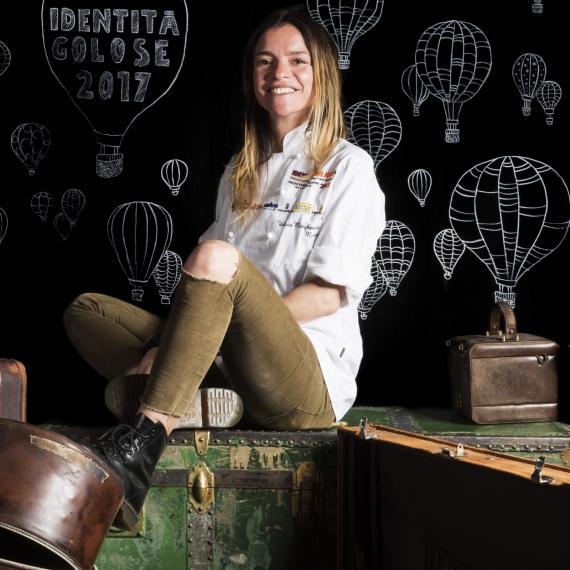Valeria Margherita Mosca

crediti: Brambilla - Serrani
Wood*ing
via Resegone, 25
Desio (Monza-Brianza)
+39.331.4143303
“Research & training, forager & chef” is the definition Valeria Mosca(the extended version is Valeria Margherita Mosca Caglio) gave to herself. We can already understand the complexity of this person, who is not a researcher, nor a chef and not even a forager(for the meaning of the latter word, please ask Rene Redzepi, the most successful amplifier of this word). She’s all these professions together.
Born and raised in Brianza, a graduate in Cultural heritage preservation and an important experience in Giancarlo Morelli’s kitchen at Pomiroeu in Seregno, Valeria foundedWood*Ing, subhead Wild Food Lab, in the headquarters in Villa Buttafava, on the border between Desio and Seregno. It is one of the most unique and interesting projects we’ve come across lately. With her there’s wild-mixologist Giuseppe Mancini, chemist-toxicologist Micaela Placentino, bio-technician and fermentation expert Luca Giuliano, and artist/craftsman Virginia Devoto.
It’s a team of freelance professionals who work so as to give value to wild food in all its shapes. Mostly through three phases: harvesting, preservation and use in the kitchen. Phase one means inspecting soil and trees in the most varied territories and carefully uproot a series of wild edible species which an impressive botanic knowledge manages to name each with their Latin name (rumex acetosa,silene vulgaris, achillea millefoglie...). This is alimurgia, the science focusing on the study of the edible characteristics of wild plants, a common practice in the 19th century, especially during the cyclical famine periods.
Phase twois that of the preservation, analysis and experiments on the harvest. In the Wood*Ing Lab the guys investigate on fermentations, homo or hetero-fermentative starters, aspergillus oryzae moulds and food safety pH. Why should they stop at the dogma of a cooking based on fresh and seasonal ingredients? It is proven that many ingredients taste better and are more nutrient if you eat them a few weeks or months after collecting them. «Bacteria are often a resource, not an enemy», warns Valeria.
Then there’s phase three, in the kitchen: once or twice a week, the guys create some tasting menus so as to make a complex matter pleasant and more approachable. In the menu you can find dishes such as Oyster with marinated alkekengi physalis or Soup with nuts such as faggiole, peanuts, pine nuts and almonds. Their mission is to educate on elements that, unknowingly, we step over every day. Uproot a very rich world, submerged in the oblivion in which it fell.
See also
Wooding, wild magic
Has participated in
Identità Milano
born in Milan, 1973, freelance journalist, coordinator of Identità Golose World restaurant guidebook since 2007, he is a contributor for several magazines and teaches History of gastronomy and Culinary global trends into universities and institutes. Author of "Cracco in Galleria" (Phaidon e L'ippocampo) and "Contemporary Milanese Cooking" (Guido Tommasi). Instagram @gabrielezanatt